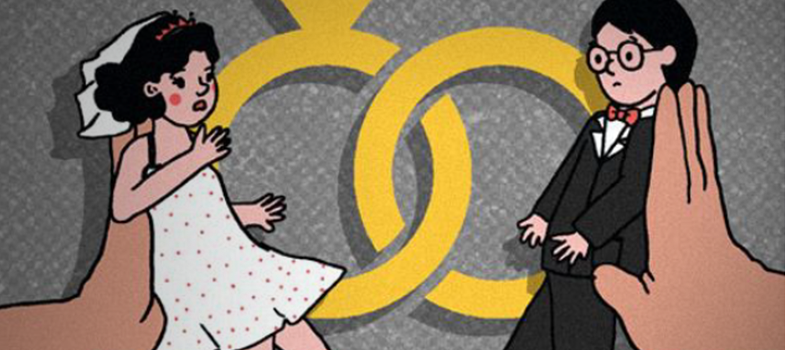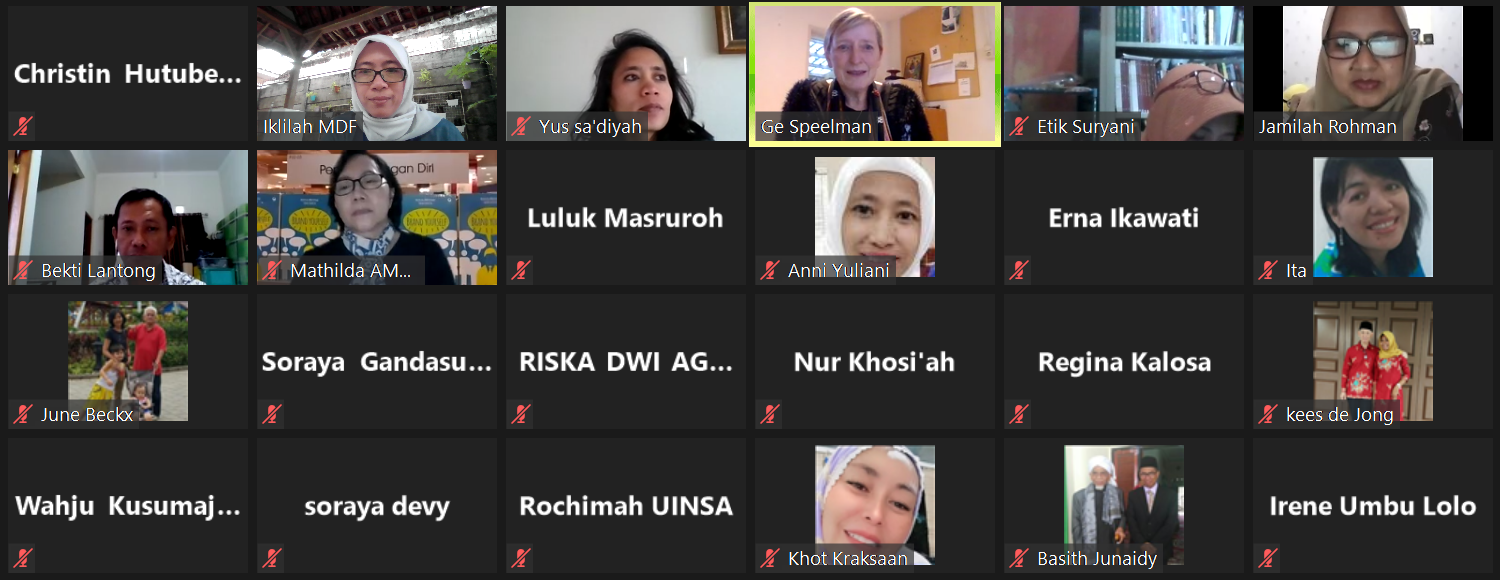Pandemic Covid-19, Child marriages and Gender equality
Bilingual webinar, 30 November 2020
PANDEMIC AND CHILD MARRIAGE in Indonesia
HOUSEHOLDS AND COVID-19 in The Netherlands
by June Beckx
The webinar participants are welcomed by NICMCR Steering Cte member Zainal Abidin Bagir, who reflects on the coming 10th anniversary of the Consortium next year. He mentioned that, notwithstanding it’s ‘old’ age, the Consortium is still very young, in a sense that it has ample opportunity to grow in the coming years, especially with the installation of the 3 working groups or Pokja’s to scrutinize most actual issues in their field.
Opening the sessions, Iklilah MD Fajriyah, Program Gender Studies University of Indonesia, starts with the fact that although there are statistics available, for instance about the number of children in Indonesia and the number of cases of child marriage, these numbers are questionable since we assume that not all births are registered by the KUA (Office of Religious Affairs). There are also many children, who are married more than once, of which not all marriages are registered, for example, in Lombok only the third marriage of a girl was registered. Patterns of child marriage practices show that often registration takes place only when they have reached the age requirements or in cases of age manipulation.
The dominant age when child marriage occurs, is 16 – 17 years (about 70%), when they are in the end class of Junior High School (SMP) or first class Senior High School (SMA). Usually they (have to) leave school, becoming school dropouts missing favorable future prospectives, for themselves, for their communities, for the nation. In Indonesia, only 5,3% of women who are married and divorced, successfully complete their education at the SMA-level.
Notwithstanding the revised Marriage Law no 16/2019 – which came into effect thanks to the hard struggle of children rights activists – contains a revision of the minimum age limit for women to marry from 16 to 19 years, equal to the age for men, these amendments have not changed the practice of child marriage in Indonesia. This is shown by the many applications for marriage dispensation, which amounted from 13.484 cases before the Law revision, to 23.793 in 2019 and 34.413 in the first 6 months of 2020. Only 1,5% of the cases were rejected.
Since the Covid – 19 pandemic, the number of child marriages in Indonesia has increased. Diminishing family income forces children to marry to reduce the family’s economic responsibilities, besides other factors like the dating intensity caused by ‘school from home’ activities and increased child predator behavior in relation to cyberspace vulnerability of the children.
In view of the deteriorated situation in Indonesia due to the covid-19 pandemic, the situation in the Netherlands appears to be less bad.
Gé Speelman, Lecturer at the Protestants Theological University, Amsterdam, chose a research on Corona and Vulnerable families of June 2020 as startingpoint, a research among 1200 families, families known by social services because of domestic problems.
Surprisingly the conclusion was that there was no increase in the level of domestic violence in these families. The lockdown enhanced increased confidence and improved communication between children and parents. Because of closure of the pubs, there was less use of alcohol, often the cause of increased stress and domestic violence.
In general, the pandemic even had a positive effect on the Dutch households. There were new levels of interests and hobbies, better relation within the families and with the neighbours. Men were doing the household, reappreciating household skills. Covid-19 even strengthened the trend of self employment and home as working place for the higher professions.
These surprising outcomes brought Gé Speelman to the reflection of theologian Ina Praetorius on the meaning of the home. The word economy is derived from the old Greek words oikos (house) and nomos (management). The question is whether modern economy (ins and outs of the market) is still the territory of adult males like it was in this so called classical pattern (of Greek patriarchal households) where the husband works for money and the wife takes care of the household. She then quotes on Arlie Hochshild, writer of ‘the second shift’, which covers the double burden of women with (parttime) jobs, who coming home after work, still have to take care of the household, whereas for men it usually is their time of leisure.
Would Covid-19 become a catalyst for change of this concept? Would the rediscovery of home and house care have a lasting effect or is it just momentarily? Could there be a paradigm shift from an economy of money to an economy of care.
Gé Speelman has her doubts about the idealization of care: more and more women are now not confined to the house anymore, but do small, odd parttime jobs, often underpaid. Care is more and more commercialized, care can be bought with money, for instance rent for childcare, rent for care of the elderly. In the beginning of the pandemic, caregivers were lauded as heroes. However, the willingness to pay their salaries is another question, because most caregivers are female and underpaid. In return, these underpaid women will have their ‘second shift’ after they come home.
At the discussion, the question is raised what the repercussions are for children after marriage in terms of education? Iklilah Fajriyah mentions that in Indonesia, there is actually no regulation barring access to school for married children, but it is the schoolprinciples themselves who will not have them enter their schools again. Solutions are therefore informal education (sekolah penyetaraan), teaching them skills, strengthen their self autonomy, encourage use of contraceptives etc.
Often claimed that economy is a cause of child marriages, to Iklilah Fajriyah, economy is only the trigger factor, not the cause, because there are many poor families also who do not have their children married. According to her, the main factor is the parents’ mindset, which sees marriage of their child as the easiest solution. They are not aware of the risks for the child, like domestic violence, reproductive health problems, etc. The next factor is their unawareness of the law in terms of religion, adat and state, which complement each other.
According to Gé Speelman, pregnancies outside marriage, also happen in the Netherlands, often the case with people on the socially lower level, a lot are migrant girls. Although there is a social support system, but it is often stressed that there is a choice not to marry. The idea is to enable women to make their own choice in shaping their future.
When asked about the role of local cultural customs in endorsing child marriage, Iklilah Fajriyah mentions that because of adat, the number of child marriages is higher in the villages than in urban situations. Adat and religion are often intertwined, what matters is the mental, physical and economical readiness. Adat looks if the girl is ready to do reproductive work like cooking, taking care of younger kids, whereas according to religion, a girl is ready to marry by her first menstruation, often when she is at 5th grade of elementary school. This concerns Muslims as well as Christians, in NTT for instance, culturally, pregnancies are cause for marriage, which in return has to do with ‘belis’ customs. Lately there are churches, who abide to the law and refuse to bless such marriages, which is a good sign.
Gé Speelman: culture still plays a strong role in the Netherlands as well, even though its modern, secular society. Household has a strong cultural value, work at home for the women, is very important, although not paid. Due to the Covid-19 situation, men are more aware of household affairs and care work is more valued. But to proof these assumptions, we first have to await the outcome of the debate in Parliament about salaries for women in care professions.
Iklilah Fajriyah regrets that marriage is always seen as solution for unpredicted pregnancies. She stresses that there are many and better alternatives. For instance, abortion, which is allowed in Islam, provided there are valid reasons, the fetus is not older than 4 months and the operation is using safe methods. This not only applies for pregnancies outside marriage, but even for married couples who for some reason can not cope with an unwanted pregnancy. There are also psychological means, such as counseling, supportive guidance by the family, timely reminding of the physical risks of early motherhood.
“Let children who are already in a bad situation, not get trapped into a worse situation!” should be the basic principle. Iklilah Fajriyah makes it a point that stopping child marriage cannot be done without synergy of parents, educational institutions, society leaders as well as religious leaders. It is time that the predominantly conservative religious view should take place for an alternative discourse leading to termination of child marriage.
Gé Speelman indicates that Christian perspectives regarding abortion are very different. The Catholic church does not allow it, comparable to the debate when life starts. In many Protestant churches, it is allowed, when there are difficult circumstances, medically, psychologically etc. But, it is always stressed that abortion is a tragic decision and should not be an easy step to take.
Both Iklilah Fajriyah and Gé Speelman underline the need for proper sex education. Although still a topic of taboo in Indonesia, there are already many efforts done towards this goal. Many children rights activists are working on the matter with children, as to make them aware of the need of contraceptives and warn them for risks and dangers from outside, ready to trap them into having unwanted sexual relation.
The benefit of sex education is evident, as it is shown by the decreased number of abortions in the Netherlands, which has to do with improved sex eduction and increased use of contraceptives.
Moderator Jamilah concludes that the debate on the shared topics is far from finished, there is ample work to be done and to be scrutinized by NICMCR, for instance contemplating on steps to be taken for sex education.

